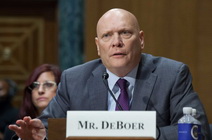A five-month extension of the National Flood Insurance Program (NFIP) was passed by Congress hours before its scheduled July 31 expiration and signed by President Trump later that day. The NFIP extension gives the House and Senate additional time to work towards long-term reauthorization.
 |
If the National Flood Insurance Program had lapsed, the Federal Emergency Management Agency would not have been able to issue new policies, and its borrowing authority would have been reduced to $1 billion from $30.4 billion. This would have had major effects on the real estate markets in coastal areas, where a flood insurance policy is mandatory for obtaining a new mortgage. |
The Roundtable will continue to work with lawmakers and our coalition partners to assist with NFIP reforms and a long-term reauthorization, that would help protect the nation's commercial and multifamily business-owners, their properties, and residents.
The Senate on August 1 approved the National Defense Authorization Act for Fiscal Year 2019 (NDAA) – a compromise $717 billion defense policy bill aimed at building up the military and blunting Chinese foreign investment – which includes language that may affect some foreign purchases and leases of real estate near military and other strategic facilities.
 |
The final version of the NDAA – including FIRRMA – would expand the list of covered transactions to include some foreign purchases and leases of real estate near military and other strategic facilities. It is anticipated that President Trump will sign the legislation in August. |
A congressional conference committee reconciled House and Senate versions of the NDAA last month. The final version of the NDAA – including FIRRMA – passed the House on July 26 and the Senate on Wednesday. It is anticipated that President Trump will sign the legislation in August.
With millions of workforce and low-income Americans facing a lack of affordable housing, a group of nine bipartisan Senators recently introduced legislation that would create a task force focused on policy recommendations to address the nation's housing scarcity problem. (Sen. Heller News Release, July 18)
 |
With millions of workforce and low-income Americans facing a lack of affordable housing, a group of nine bipartisan Senators recently introduced legislation that would create a task force focused on policy recommendations to address the nation's housing scarcity problem. (Sen. Heller News Release, July 18) |
 |
Roundtable President and CEO Jeffrey DeBoer testified before the Senate Finance Committee: "And we need to focus on ways to incentivize affordable housing, not just low-income housing, which is obviously needed, but workforce housing as well ... it is certainly a growing and troubling problem. And as we go forward, that part of our nation has to be included in whatever is done in economic growth." (Hearing Video Clip, Sept. 19, 2017) |
The Roundtable's 2018 Policy Agenda, released in February, recognizes the affordable housing challenge – "As many of our nation's urban areas become more expensive, our industry continues to recognize and support housing not only for lower income residents, but also for the nation's middle income workforce. A stable, healthy commercial and residential real estate economy facilitated by sensible federal policies can continue to improve our national standard of living." (Introduction, 2018 Roundtable Policy Agenda)